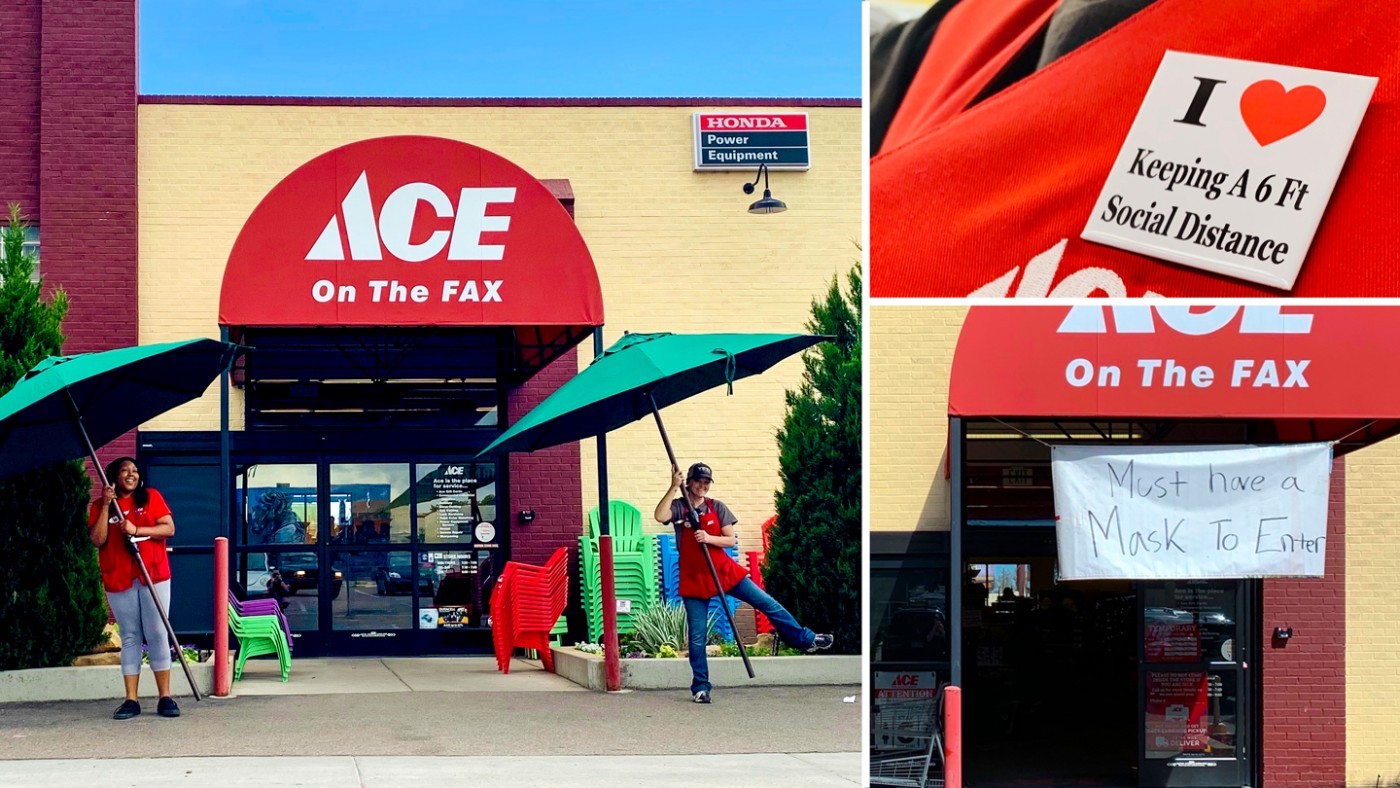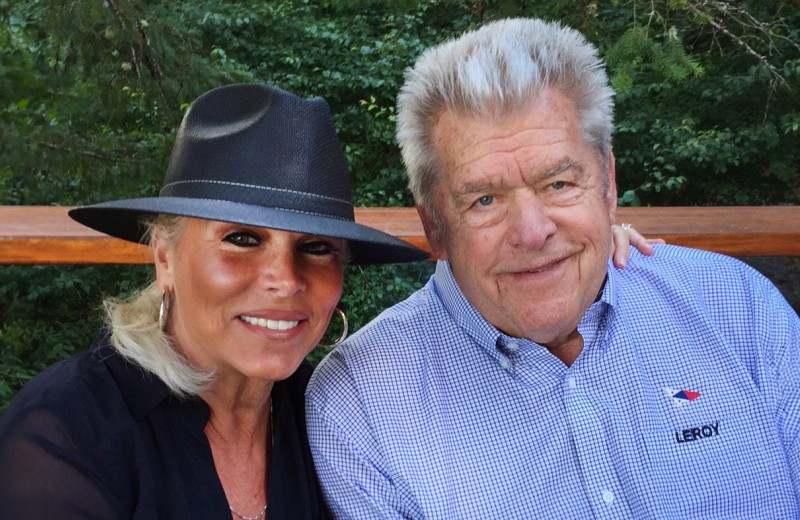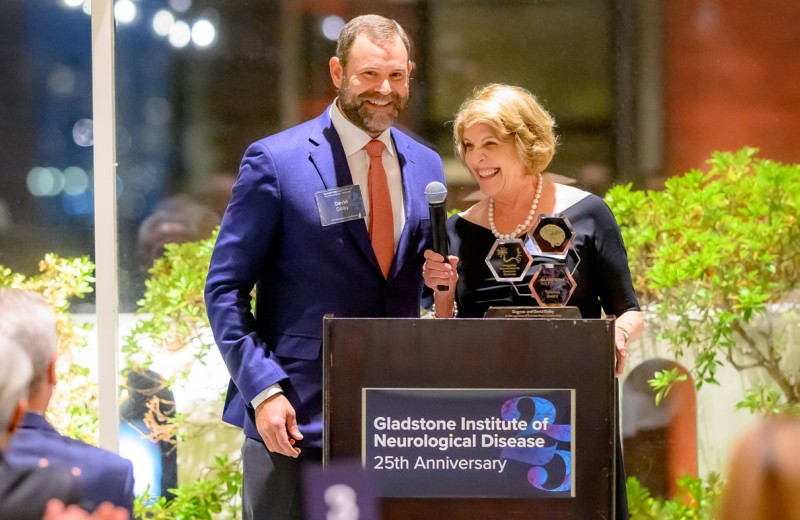Gladstone NOW: The Campaign Join Us on the Journey✕

Ace Hardware located in Denver, Colorado.
When Anthony Mazlish received a call from Gladstone Institutes about their fight against COVID-19, he was impressed. He saw the potential in every project, from a diagnostic test run on a smartphone to testing FDA-approved drugs on human lung tissue, and decided to support Gladstone’s efforts. Mazlish isn’t a grants officer at a major foundation. Nor is he an agent allocating federal funds to scientific research. He owns and runs X-Chair, a Maryland-based e-commerce retailer of ergonomically designed office chairs. Mazlish’s partnership with a biomedical research organization like Gladstone is an unlikely one but rooted in a common desire for scientific breakthroughs to combat COVID-19.
Mazlish first realized the weight of COVID-19 when his son, who Mazlish describes as a “data nut,” shared case numbers with him. As the first confirmed case from community transmission in February 2020 turned into more than 50,000 cases by mid-March, the data told the story of the disease’s rapid spread. Mazlish began looking for ways to help. After focusing on the local community’s needs in the face of COVID-19 related job losses and potential for a healthcare system overload, Mazlish soon realized he needed a third pillar of efforts to focus on. He quickly concluded that “the research component is the most important driver of a solution” and began looking for researchers fighting the pandemic. Soon after dedicating a page on the X-Chair website pledging 5 percent of profits to local, national, and research needs, Mazlish received a call from Gladstone.
Mazlish saw the potential in Gladstone’s projects and knew he wanted to get involved in long-term solutions. “At a certain point, most of us have realized that there are no quick answers,” he says. “We really have to pursue every possible avenue to find out what’s going to have the most impact on our health, on the economy, et cetera.” Mazlish was struck by the multi-faceted research projects at Gladstone and saw the potential to “make a difference, not just for COVID-19, but probably for other infectious diseases that unfortunately are probably to come.”
Mazlish decided to donate not only funds to purchase necessary personal protective equipment (PPE) for researchers studying the live SARS-CoV-2 virus, but ergonomic office chairs to support the researchers as they work. He sees this as a common-sense partnership with a huge return, not only for him and his business, but for the lives of people around the globe. There’s no hesitation from Mazlish about what other business owners can do to help end the pandemic: “Check out Gladstone and the work they do,” he says.
“We really have to pursue every possible avenue to find out what’s going to have the most impact on our health...”
The need for PPE sparked another unlikely partnership with the independently owned Ace hardware store in Denver, Colorado. In early March of 2020, store owner Mary Cottrell received a phone call from a Denver ICU doctor in need of PPE. After determining the protective equipment obtained through the hardware industry would be adequate for health care workers, Cottrell went to work using her network of fellow business owners and the store’s established PPE supply chains to obtain materials.
“We decided that our store would focus on finding and obtaining as much as we could through the hardware channel and redirect it to health care,” says Cottrell. It was also important to prioritize getting PPE into the hands of health care workers before construction industry professionals. That focus, through donations Cottrell made and the supply chain access she provided, proved invaluable as case numbers rose and hospitals competed for limited PPE from traditional health care product suppliers. At one point, a Denver hospital called and asked for all the PPE sitting in Cottrell’s store. Within hours, a box truck full of supplies was at the hospital ready to be distributed.
When local health care workers saw the PPE supply return to normal, Cottrell wondered who else might need PPE. A new opportunity revealed itself in the April issue of The Scientist, a magazine recommended by Cottrell’s brother, who is a biochemist researcher. In one of the articles in that issue, Gladstone Institutes Senior Investigator Melanie Ott, MD, PhD, commented on the shortage of respirators and other protective equipment in the research lab. The timing was serendipitous. “I was actually getting ready to stop this process when I saw the article,” says Cottrell.
Cottrell reached out to Gladstone and spoke with Senior Research Associate Mauricio Montano who confirmed the need for PPE. Montano described the new source of PPE as “a boost to Gladstone since these items are in high demand and difficult to get on a timely basis.” Gladstone put in an order of N95 respirators and face shields necessary for work in the BSL-3 lab, where researchers are studying the live SARS-CoV-2 virus.
Cottrell’s store has maintained its focus on safety equipment, as she remains tightly connected to her sourcing network to keep PPE stocked for researchers. Anthony Mazlish and his company continue to meet the demand from the growing number of remote workers who now see long-term stints in their respective home offices as a guarantee rather than a possibility. COVID-19 is changing lives and mindsets creating the kind of response where hardware shops and virologists join in partnership. They join together in the hope for answers to the disease found in research and science.
Support Our COVID-19 Research Efforts
Gladstone scientists are moving quickly to respond to the coronavirus outbreak. Help us end this pandemic.
Embracing Change: Darlene Hines Shares Her Journey of Growth, Resilience, and Giving Back
Embracing Change: Darlene Hines Shares Her Journey of Growth, Resilience, and Giving Back
Longtime Gladstone supporter Darlene Hines reflects on her journey of learning, growth, and giving after her husband’s passing
Donor StoriesVisionary Philanthropists Establish Center to Harness Computational Biology for Cancer Research
Visionary Philanthropists Establish Center to Harness Computational Biology for Cancer Research
A search for the brightest minds in cancer and AI led Hope and Sanjit Biswas to give in their own backyard.
Philanthropy Donor Stories Cancer Biswas Center for Transformative Computational Cancer Biology Data Science and Biotechnology Pollard Lab AI Big DataThe Risk and the Reward
The Risk and the Reward
How the Dolby family works to improve outcomes for people with Alzheimer’s disease
Donor Stories Alzheimer’s Disease



